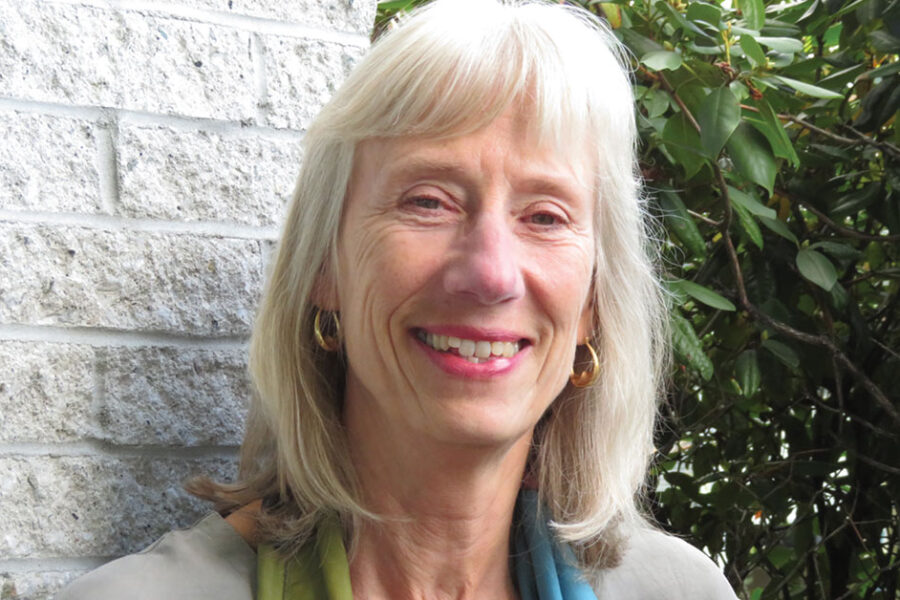“We’re not reading a book and taking a test on each chapter; we’re talking about how what you’re learning impacts your life,” says Hays Moulton, Chair of Undergraduate Studies for Antioch University’s Online programs. In his “Senior Project” course, students take a subject they’re passionate about and create a way to manifest it in the world. Every year, Moulton sees projects that vary from mapping out hiking trails to speaking to Caribbean communities about AIDS in Los Angeles. The specificity of these creates reverberations of change in students’ communities, empowering them as learners and leaders.
Last year, one of Moulton’s students was at the epicenter of global history, living in Europe when Russia invaded Ukraine. She began helping the only way she knew how to volunteer to make sure information about the war was reaching people outside of the geographic area. Moulton knew the course could be an opportunity to expand that important work. “She used her senior project to set up an informational program to tell people what it was actually like out there,” he explains.
Every student has their own perspective and interests, but classes can’t always be tailored to meet them. That’s why the Senior Project is an exciting part of the undergraduate program. While developing a project gives learners the chance to work on something they care deeply about, the class also draws on a long Antiochian history of centering life experiences as central to learning. Going beyond the classroom is necessary to make real change — and the Senior Project provides students a bridge to become active in the world around them.
Designing Projects Around Student Interests
“One of the good things about Antioch is that you bring your experience in, and you can use your class material to directly impact your own personal interest and build on that,” says Moulton. Blending a student’s personal, professional, and academic life, the Senior Project gives students a chance to pursue the areas they’re most interested in. These are often topics they’ve been drawn to since before they started at Antioch.
“They’re almost always projects or plans that have a social impact,” Moulton says. Students embrace the chance to research subjects that they’re excited about but may not have had the opportunity to explore in other classes. It’s also what makes Moulton excited about teaching the course. As he says, “It’s really fun to watch people come up with things they’ve been wanting to do for a long time, and this is their excuse to do it.”
The bespoke nature of the class is also an opportunity for students to shape their futures. With Moulton’s guidance, they can design their project to connect to long-term goals, like specific jobs or graduate programs. “You pick a topic that interests you, develop it into a project you can work on, and actually launch it during the course of the class,” Moulton says. This tailoring is useful beyond the subject matter, as it shows students’ abilities to create and implement their projects. That aspect of the work isn’t something Moulton takes for granted. As he explains, “With our particular students, the awareness that they’re adults and have other things to do is a big part of how we’re successful.” The class makes sure that projects connect to their lives on many levels.
Combining the practice of professional development with what students are passionate about is an important part of the Senior Project. It often means students are connecting to people outside of Antioch and those already working in the field students are interested in. “You go through the steps of thoroughly planning what you want to do with the project and talking to folks in the field,” Moulton says.
Community, Communication, and Learning
The class often leads to exciting new ways of thinking for students, ones they learn from peers and connect their work to the world, as much as from Moulton. He learns a lot about how important these connections are in interviews he does with students to help them process their work on the Senior Projects. “They talk about how Antioch gave them a new perspective on social issues,” Moulton says. “They try to institute small changes in their communities.”
Moulton believes a sense of community in the classroom is important too, and that it helps students grow. “Teaching is about connection,” he says. While students learn about a topic they believe is important they’re also developing communication skills. He often takes a back seat in discussions and allows students to give each other feedback. It’s an opportunity for people to explain their work to a broader audience and practice better understanding.
“Communication is key to helping people understand your point of view,” Moulton says. “You have to be able to connect things in order to write well, think well, and follow through.” Writing is a crucial skill in his class and throughout the undergraduate program.
It’s a way of organizing thoughts that Moulton often turns to himself, especially when he’s grappling with complicated ideas. This is why the research paper is an important part of the Senior Project. Through writing, students discover things about their project they might not otherwise. They also look at how their backgrounds, identities, and passions align in their projects.
Students are encouraged to do what feels right to them when it comes to how much they’re directly involved in communities. And to find their own “North Star,” or inner truth, as Moulton describes it. The explorations students take through the research paper help them better explain why they’re doing their projects and what perspectives they bring. As Moulton says, “The truth of the matter is influenced by who’s talking about it.”
A Glimpse into Some Exciting Projects
The design of the class results in an array of fascinating projects. Two students shared their Senior Projects: one assists people who have experienced human trafficking, and the other helps break the stigma of homelessness.
Grace Ann Chadwick did a project on human trafficking. Partnering with a nonprofit organization that serves people who have experienced human trafficking in her area, the local population of victims, Chadwick helped provide housing, resources, and life skills that helped people integrate back into their lives. As a massage therapist, Chadwick offered skills she had learned in her own profession to help clients establish boundaries and practice keeping them. They also made “hope bags” filled with necessities to give to clients upon their arrival.
Chadwick engaged in activities such as making vision boards to envision the future, yoga at the park, and personally mentoring survivors. Although the class helped Chadwick develop her project, it also showed her anyone can make an impact in their communities. As she says, “Antioch taught me that I don’t need a degree to be effectively involved in something I love.”
For recent student Tammy Bartlett, the Senior Project was an invitation to explore how easy it is for people to lose their housing. She did a project on what she calls “escaping homelessness.” It’s an example of how the work done in the projects can have real, direct impacts, which in this case took the form of a $300,000 grant.
Bartlett wrote the grant proposal for an organization called Big Momma’s House. They intended to buy a building to provide mental health services, counseling, life skills education, and employment assistance to houseless individuals. However, the surrounding housed community did not want the center in their neighborhood because of misconceptions about the people who would be served.
This reaction led Bartlett to extend her project beyond the class. She decided that it was imperative to educate the community on how easy it is to become houseless. Bartlett created a game in which participants draw cards with typical scenarios that can lead to long-term housing instability, like losing a job or being evicted. She also included cards where a player can access resources, to help people better understand how important these services are.
At the next fundraiser for Big Momma’s House, Bartlett plans to use the game to educate community members and hopefully break the stigma associated with being houseless. Bartlett says, “The course allowed me the space to explore creative and clear actions I could use toward a project I am still actively working on today.”



